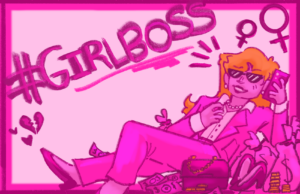Content warning: This article discusses sexual assault, eating disorders, depression, emotional abuse, and self-harm. Spoiler warning for Heartstopper season two
Defining “love” is an impossible task. From the biblical and philosophical to the romantic and platonic, love has always been a common storytelling thread. When viewed through the lens of queerness, seeking definition becomes even more complex. This summer was chock-full of highly anticipated releases navigating the less explored themes of queer love; and yet, the question remains: “what does it mean to love and be loved?”
Season two of Netflix’s Heartstopper dares to search for an answer. This season opens with the return of the darling new couple, high schoolers Nick Nelson (Kit Connor) and Charlie Spring (Joe Locke), as the pair learns to navigate something entirely new: sincere and unapologetic queer love, and acceptance of the security of their bond.
To develop this burgeoning relationship, the second season opens by paralleling and juxtaposing the first. In season one, Charlie was simply overjoyed at the thought of Ben Hope (Sebastian Croft) reciprocating his feelings (before having his hopes dashed); this season, he can relax into the comfort of his relationship with Nick. As the pair traverses love together, they become each other’s anchors in the whirlwind life of queer teenagers.
Punctuated by subtle touches and tender looks, Nick and Charlie’s romance blossoms beautifully. The pair have palpable chemistry, likely helped by the actors’ off-screen friendship. There is never a question of their affection for one another—a welcome departure from Charlie’s previous romantic experiences.
Moments of tribulation only add depth to their relationship, demonstrating its solid foundation. Over the eight episodes, we slowly learn more about Charlie’s ongoing battle with an eating disorder parallel to Nick’s journey towards full self-acceptance. The series tactfully handles this heavy topic by showing how much it weighs on Charlie, sans blame or glorification. Instead, each episode provides glimpses into Charlie’s internal struggles while the audience, alongside Nick, slowly realizes the true depth of his struggle.
The audience also witnesses the fallout from Charlie’s toxic relationship with his ex-situationship Ben, which diminished his sense of self-worth and his capacity to self-advocate. Throughout the season, Ben’s looming presence consistently reminds Charlie of Ben’s sexual assault and emotional neglect, only worsening his already degrading mental health and struggles with his eating disorder.
At the end of the season, Charlie opens up to Nick, confessing that he used to self-harm as a result of constant bullying. In response, Nick doesn’t ask Charlie to be happy or never self-harm again—all he asks is that Charlie allow Nick to be there for him. In this moment, there are neither expectations nor judgment. It’s just them. The series handles this scene tenderly, not forcing Charlie into vulnerability nor pretending that Nick is a magical remedy for his mental health struggles. Steeped in the rawness of their mutual vulnerability, this scene perfectly encapsulates their dynamic.
As an unsaid “I love you” lingers, Nick’s reassurance to Charlie that “you don’t have to be perfect with me” rings true.
Although Nick and Charlie remain the serie’s primary focus, Heartstopper masterfully navigates the arcs of its supporting cast. From Tao’s (William Gao) abandonment issues and the implications they have on his budding relationship with Elle (Yasmin Finney) to the impact of Darcy’s (Kizzy Edgell) emotionally abusive mother on her relationship with Tara (Corinna Brown), season two does an amazing job of thoughtfully fleshing out its characters’ unions. But Isaac’s (Tobie Donovan) arc this season strays away from the romantic focus of his peers’ storylines. Instead, he works on coming to terms with his aromantic and asexual identities after questioning why, unlike his peers, he lacked romantic interests. This representation is incredibly important, as it is very rare that identities along the ace spectrum get much focus—if any at all—in queer media.
Even beyond the exploration of romantic love, season two excels in spotlighting other forms of love. The characters’ interpersonal bonds this season are phenomenal. The cast’s off-screen closeness shines through in every scene as they effortlessly bounce off one another. When Tao and Nick bond after a rough start to their relationship in the season prior, and when Elle becomes closer with the girls at her school, we see the platonic relationships shine just as brightly as their romantic counterparts.
Family also takes center stage this season. As usual, Charlie’s older sister Tori (Jenny Walser) remains a constant pillar of support in his life, a counterpart to Nick’s antagonistic older brother, David (Jack Barton). Each episode also explores the impact of parental role models in the lives of queer youths. While some mothers in the show have remained steadfast in their support, other parents exemplify the negative impact that unsupportive adult figures can have on young adults. This makes the nonfamilial role models—like school faculty members Mr. Ajayi (Fisayo Akinade), Mr. Farouk (Nima Taleghani), and Coach Singh (Chetna Pandya)—stand out as excellent queer role models for the young characters.
As the icing to this season’s cake, the series’ signature cartoonish animations and stellar soundtrack add an extra element of whimsy. Songs like Wasia Project’s “ur so pretty” and mxmtoon’s “coming of age” perfectly score their respective scenes. The animations are also integral to the series, as they speak volumes where words would simply fail. In one instance, Ben stands inches from a roiling wave of rainbows, with the chance of finding a queer community and acceptance calling out to the tune of harps, piano, and a soothing beach. Yet he walks away, leading the waves to pull back, and a dull and potent silence falls over the scene as he retreats into the shadows. Without excusing his horrible actions, this scene shows that Ben, like many others, stands just on the edge of making a change for himself, but he’s held back by the internalized homophobia that plagues him.
By continuing character arcs from its predecessor, season two capitalized on the show’s existing momentum and hit its stride beautifully, treating all its subject matter with care while maintaining the tenderness for which fans have come to adore the series. Cliché as it may be, love does not boil down to symbiotic perfection nor tragedy-borne connections. Rather, Heartstopper tells its audience that to love and be loved is simply to be cared for. And sometimes, that’s enough.





